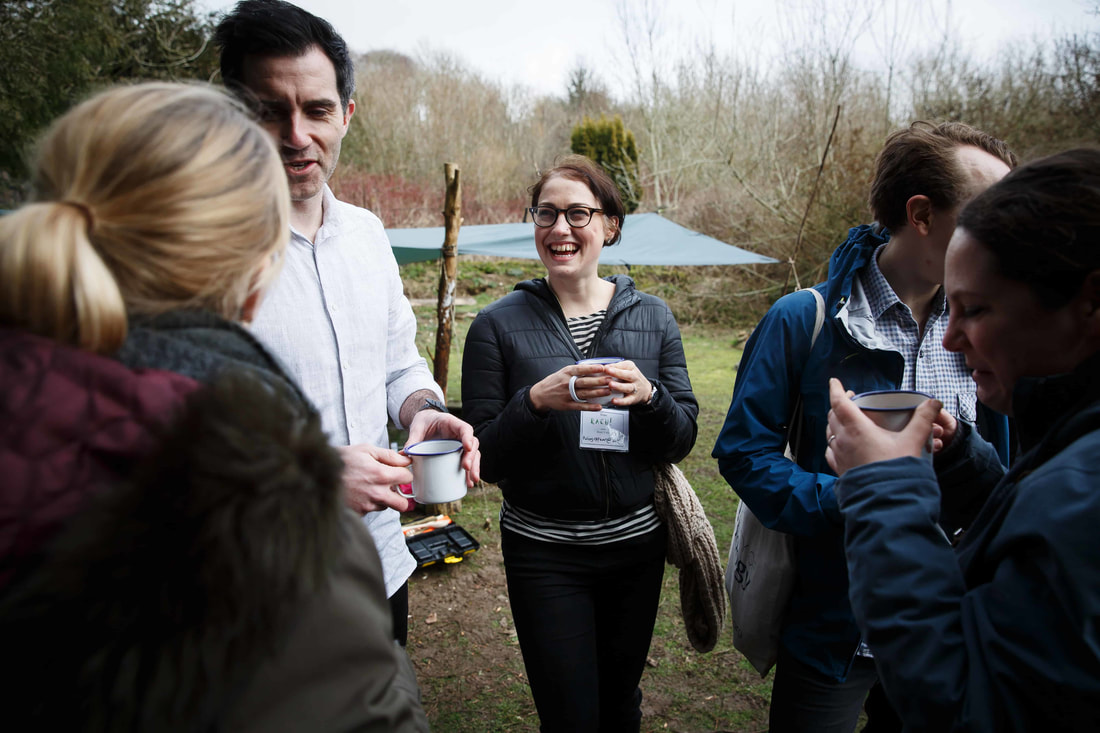|
Spending time in nature with your team is a powerful way to boost your workplace culture and employee wellbeing, and has a dramatic effect on creative thinking and team cohesion, says Liz Naven In the past few years, culture change and workplace wellbeing have become staples of the modern office. Prompted by research demonstrating the inextricable link between employee happiness and productivity, organisations are placing serious attention on initiatives to improve employees’ experience at work, inspired by forward-thinking companies such as Google and Zappos. Although your company may not have a budget as large as these tech giants, chances are you're looking to replicate the same positive company culture with practical alternatives that make work a positive experience for all, with a consequent impact on your bottom line. Leadership and team development programmes, combined with flexible working hours, on-site massage and fitness classes, and duvet days are just some of the perks you might already be offering in a bid to increase employee happiness, engagement, and productivity. The results are usually worth the effort: organisations who get culture right, combined with properly-designed wellness programmes enjoy large financial returns, amongst other competitive advantages. For example, according to research from Harvard Business Review, Johnson & Johnson's wellness programs cumulatively saved the company $250 million on health care costs, with a return of $2.71 for every $2 spent, between 2002 to 2008. Yet are you overlooking the most effective activity to transform culture and wellbeing? To create a positive workforce full of high-performing employees, you may just need to send your team outdoors. Being outdoors in nature has a dramatic range of benefits, for both physical and mental health. Time spent outdoors boosts mood and energy, improves attention and encourages connection and community. If your business aims to put culture first, wants to prioritise the wellbeing of your employees, and improve workplace productivity, getting your teams to spend time in nature as part of their working life can be a vital piece of the process. Here’s 6 reasons why taking your team outdoors is good for business: 1. Time spent in nature increases creativity by as much as 50%. Creativity is one of the most-valued skills in today’s workplace. While inspiration can strike at any moment, it’s unlikely to come when you’ve been sat at a desk for eight hours straight. Evidence shows that routine monotony, high levels of stress and an inability to disconnect from technology, combined with a static and uninspiring working environment, leaves little room for creative thinking. Instead, changing the environment and getting your employees away from the motions of their everyday working lives counters creative lulls. A study published in 2012 showed that immersion in a natural environment increased people's problem-solving ability by 50 percent, so take advantage of local parks and wild spaces for walk n talks, strategy meetings and ideation sessions. 2. Nature is a powerful remedy for distracted thinking. Distracted thinking is one of the by-products of advances in modern technology. Smart phones, social media and the internet all impact your ability to focus and to think strategically, placing an unnecessary demand on your attention. But spending time outdoors provides an opportunity for effortless reflection, which in turn restores attention and leaves your senses refreshed, making it much easier to think creatively. According to Dr. David Strayer, a cognitive psychologist at the University of Utah, his research demonstrates the positive impact of nature on attention restoration. Strayer suggests that rather than bombarding you with information, the natural world provides a gently stimulating, and ultimately relaxing, environment. Nature doesn’t demand a response from you, instead it leaves space for passive contemplation and reflection. As such, it encourages spontaneous thought – so if your team is stuck on a problem or looking for a creative solution, going for a walk in the woods or getting together around an outdoors fire, might be just what you need. 3. Of course, it’s not just your creativity that gets a boost from being outdoors: time spent in nature also helps increase your energy levels. Research shows that when you work too many hours or try to cram an unrealistic amount of tasks into your day, your levels of efficiency and productivity plummet. Recovery time is vital to improving your performance at work; taking regular breaks should be a priority, and it’s especially good for you when those breaks are in green spaces. Spending time outdoors has been shown to have a revitalising effect on the mind and body. These findings come from Professor Richard M. Ryan, whose research reveals that just 20 minutes in nature is enough time to experience a significant boost in energy. Urging your employees to take time out of the office and in the open, will leave them feeling refreshed and ready to get back to work with renewed energy and enthusiasm. 4. What’s more, taking a break in nature improves cognitive function. According to Dr. Eva M. Selhub, a scientist who specialises in stress, resilience, and organisational wellbeing, removing yourself from the distractions of the workplace results in increased concentration and enhanced memory function. Selhub argues that we underestimate how heavily the human brain is influenced by its physical environment. Her research shows that reduced contact with nature actually leads to reduced cognitive function, and multiple studies come to the same conclusion. Breaks in nature, then, are a necessary requirement for your employees to perform at their best. 5. Many of the cognitive benefits of being in nature come from distancing yourself from the stressors of everyday life. Improved workplace productivity and enhanced creative thinking happen when you take a break from technological stimuli. Being in nature doesn’t just offer much-needed distance from workplace stress; multiple studies show that ‘wild time’ actually reduces stress hormone levels in the body. Poor stress management in the workplace contributes largely to dissatisfaction amongst employees. Increased levels of stress are associated with elevated levels of cortisol in the body, which has extremely negative consequences on your physical and mental health, leading to problems such as high blood pressure, insomnia and lowered immune function. Being in nature neutralises stress and its effects, promoting physical wellbeing and boosting mood. This is why practices like forest bathing are gaining huge popularity right now. Originating in Japan in the 1980s, the therapy is recognised as a pivotal part of the country’s preventative healthcare system. Forest bathing is a way to immerse yourself in nature, bathing the mind and body in greenery. Its positive effects have been studied extensively by Yoshifumi Miyazaki, the deputy director of Chiba University’s Centre for Environment, Health and Field Science. His research has confirmed that time spent in a forest setting lowers levels of cortisol as well as blood pressure and pulse rate. What’s more, it may also improve immune system strength, increasing the number of cells that fight off infections and cancer. It’s clear then that exposure to green spaces should be a vital part of stress management interventions in the workplace – not only to reduce sick leave and avoid burnout amongst employees, but also to improve happiness and wellbeing. 6. And all the better if employees are exposed to nature as a team. Taking employees out of the workplace and into a natural setting fosters improved communication and collaboration between individuals. Nature provides an open and unstructured environment in which groups can get to know each other better, without the restrictions of social hierarchies. This lets individuals connect on a deeper level, breaking down personal barriers, building trust and forming meaningful relationships. Studies have shown that being in nature positively influences people’s willingness to help each other. Pro-social behaviours, such as empathy, generosity, trust and agreeableness, all increase when individuals spend time outdoors. Professor of psychology and social behaviour, Dr. Paul Piff, posits that this is due to the sense of awe that we experience in nature. His research shows that feeling small in the face of nature helps you to direct your attention outwards, rather than inwards. By shifting your focus onto others, you learn to see things from their perspective and are more likely to offer support and cooperation. Being in a natural environment also requires individuals to adapt and respond to new situations and challenges. When employees engage in outdoors team building exercises and activities, there is a real need for them to communicate with and support each other. This builds social cohesion within a team, which is ultimately what creates a successful workplace culture. From inspiring creativity, restoring energy and boosting immunity, to reducing stress, improving social connection and promoting both compassion and resilience, there are many obvious reasons why you should be taking your team outdoors. However, the most important reason of all is simply because it makes people happy. Our affinity to the natural world is innate; it’s something that perhaps can’t quite be explained. By taking your team outdoors and reconnecting them with the natural world, you’ll remind them just how alive that world can make them feel. And that’s good for business. School of the Wild's outdoor team building away days in nature are a proven way to bring teams and organisations together to relax, reconnect and be inspired. Find out more here. Comments are closed.
|
Author & CuratorNigel Berman is the founder of School of the Wild. Archives
March 2024
|
Leaders |
About Us
Support |
|





 RSS Feed
RSS Feed



